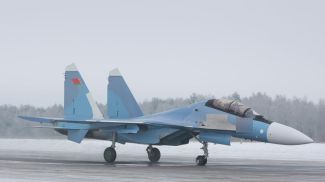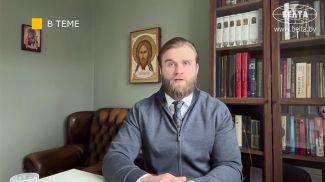
MINSK, 12 July (BelTA) - 30 years ago, in 1994, Aleksandr Lukashenko won the presidential election for the first time, becoming the first president of Belarus. The ONT TV channel released a documentary exploring how the young politician won the hearts of voters. The documentary is called "One for All" and is dedicated to the 30th anniversary of the institution of the presidency in Belarus, BelTA has learned.
"I knew that he was the future president. I looked at him, at Chikin, a representative of the Communists, others. I listened to him speaking and got the feeling that he was the future president. Although I was in the Kebich government,” said Sergei Gaidukevich, who was the leader of the Liberal Democratic Party in 1995-2019 and who participated in the presidential elections as a candidate several times.
Vladimir Konoplev, who was an assistant to Aleksandr Lukashenko during his parliamentary years and after being elected president, recalled an interesting moment about the Belarusian leader: "When we already moved to, if I am not mistaken, to the residence on Bronevoi Pereulok (he slept in one room, I was in the other), he always got up at 4 or 5 in the morning. He did his workout no matter what. He came into the room and said: "Get up! Let’s go and do some business. After all, you wanted me to become president." I will never forget these words."

"He knew how to talk to people, he heard the people, their concerns. He is a polemicist of the highest caliber. He was not afraid to take the floor, to argue with the opposition, unlike other members of the Supreme Council," said Vladimir Andreichenko, the speaker of the House of Representatives of the National Assembly of Belarus for several convocations; a member of the Supreme Council of Belarus in 1990-1994.

Aleksandr Lukashenko was not part of the political beau monde. He had neither administrative resources, nor a party behind his back, nor financial assistance from abroad. A presidential candidate must collect 100,000 signatures.
"The president was always on the move. He with one of his teams traveled around the country, speaking in one place, then in another. Meanwhile, we, the second team, collected signatures," Vladimir Konoplev said.
He campaigned not only in word, but also in deed, by personal example. "He was a country man. He has, as they say, the common touch. He had a specific job, he was a manager. There was a time when he offered job contracts. An average salary in the farm was, say, 90-100 rubles. People on this contract received 800-900 rubles, which was 9 to 10 times more!" Vladimir Konoplev recalled one of the facts.
Deputy Minister of Internal Affairs - Commander of the Internal Troops Nikolai Karpenkov said that back then the so-called department of bodyguards was set up in the main directorate of state security. There was a lot of work. "We traveled around. To Brest, Grodno, to Gomel. In Minsk there was a lot of work too as there were many meetings with labor collectives," he said.

Nikolai Karpenkov noted that Aleksandr Lukashenko could convince anyone, even if people were initially wary of him: "You know when Aleksandr Lukashenko was leaving a meeting, everyone was happy to shake his hand, everyone applauded, and everyone had the feeling that they could trust this man, that he knew where to lead the country."
When recalling the 1994 election the long-term head of the Belarusian CEC Lidia Yermoshina said: "I would call it the election of hope. The mood during the election campaign was extremely positive. People believed that life would finally change for the better, that the country would have a leader rather than a collective manager in the face of the Supreme Council which, as they say, was talking the talk for four years."

The first steps by Aleksandr Lukashenko as head of state were also telling. He did not look for those responsible for the then difficult and sometimes critical situation in the country. He took full responsibility. It was with these words that he addressed the MPs in the Oval Hall. "As President, I take full responsibility for the situation, current and past. I will bear responsibility to you and the people over the implementation of this program," he said. The president said that it was important to take the country away from the edge of an abyss. He identified three priorities that were of interest to all the people: export, food and housing construction.
"I knew that he was the future president. I looked at him, at Chikin, a representative of the Communists, others. I listened to him speaking and got the feeling that he was the future president. Although I was in the Kebich government,” said Sergei Gaidukevich, who was the leader of the Liberal Democratic Party in 1995-2019 and who participated in the presidential elections as a candidate several times.
Vladimir Konoplev, who was an assistant to Aleksandr Lukashenko during his parliamentary years and after being elected president, recalled an interesting moment about the Belarusian leader: "When we already moved to, if I am not mistaken, to the residence on Bronevoi Pereulok (he slept in one room, I was in the other), he always got up at 4 or 5 in the morning. He did his workout no matter what. He came into the room and said: "Get up! Let’s go and do some business. After all, you wanted me to become president." I will never forget these words."

In the Parliament, Aleksandr Lukashenko stood out for his stern temper and uncompromising position on corruption. The film showed archival footage of one of the pre-election meetings with people, where he made the following promise to the people: "We will deal with crooks in the government first and then everywhere else."
"He knew how to talk to people, he heard the people, their concerns. He is a polemicist of the highest caliber. He was not afraid to take the floor, to argue with the opposition, unlike other members of the Supreme Council," said Vladimir Andreichenko, the speaker of the House of Representatives of the National Assembly of Belarus for several convocations; a member of the Supreme Council of Belarus in 1990-1994.

Aleksandr Lukashenko was not part of the political beau monde. He had neither administrative resources, nor a party behind his back, nor financial assistance from abroad. A presidential candidate must collect 100,000 signatures.
"The president was always on the move. He with one of his teams traveled around the country, speaking in one place, then in another. Meanwhile, we, the second team, collected signatures," Vladimir Konoplev said.
He campaigned not only in word, but also in deed, by personal example. "He was a country man. He has, as they say, the common touch. He had a specific job, he was a manager. There was a time when he offered job contracts. An average salary in the farm was, say, 90-100 rubles. People on this contract received 800-900 rubles, which was 9 to 10 times more!" Vladimir Konoplev recalled one of the facts.
Deputy Minister of Internal Affairs - Commander of the Internal Troops Nikolai Karpenkov said that back then the so-called department of bodyguards was set up in the main directorate of state security. There was a lot of work. "We traveled around. To Brest, Grodno, to Gomel. In Minsk there was a lot of work too as there were many meetings with labor collectives," he said.

Nikolai Karpenkov noted that Aleksandr Lukashenko could convince anyone, even if people were initially wary of him: "You know when Aleksandr Lukashenko was leaving a meeting, everyone was happy to shake his hand, everyone applauded, and everyone had the feeling that they could trust this man, that he knew where to lead the country."
When recalling the 1994 election the long-term head of the Belarusian CEC Lidia Yermoshina said: "I would call it the election of hope. The mood during the election campaign was extremely positive. People believed that life would finally change for the better, that the country would have a leader rather than a collective manager in the face of the Supreme Council which, as they say, was talking the talk for four years."

The first steps by Aleksandr Lukashenko as head of state were also telling. He did not look for those responsible for the then difficult and sometimes critical situation in the country. He took full responsibility. It was with these words that he addressed the MPs in the Oval Hall. "As President, I take full responsibility for the situation, current and past. I will bear responsibility to you and the people over the implementation of this program," he said. The president said that it was important to take the country away from the edge of an abyss. He identified three priorities that were of interest to all the people: export, food and housing construction.













